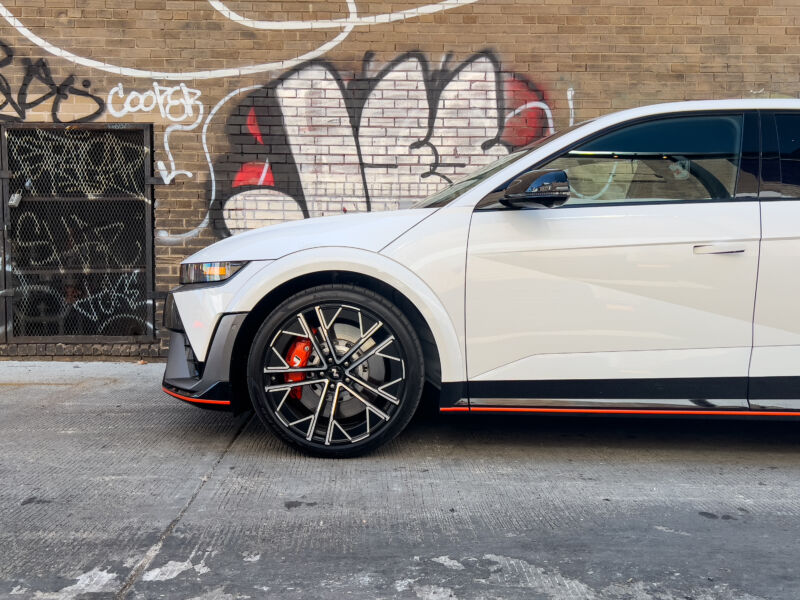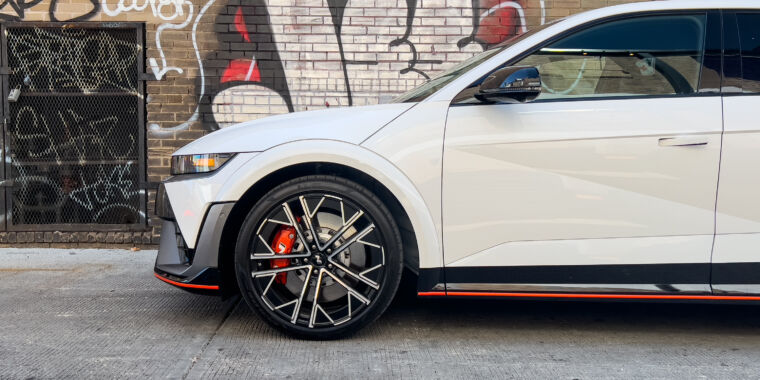
Jonathan Gitlin
Hyundai’s transformation over the past decade and a half has been one to watch. The automaker went on a hiring spree, luring design and engineering talent away from the likes of BMW and Audi to grow its own competency in these areas. It worked—few can rival the efficiency or charging speed of the current crop of Korean electric vehicles, for instance. And Hyundai’s N division has shown it can turn prosaic underpinnings into performance cars that push all the right buttons. Both of those things are on vivid display with the Ioniq 5 N.
The regular Ioniq 5 has been on sale for a while now, long enough to have just received a facelift. It’s one of our favorite EVs, with styling that calls back to the angular hatchbacks of the 1980s and an 800 V powertrain that’s easily best-in-class. Now, the company’s in-house tuners have had their way with it, applying lessons learned from rallying and touring car racing to up the fun factor.
It’s not exactly a novel approach, even for EVs. Kia beat Hyundai to the punch with the EV6 GT; the car is fearsomely fast, but I found it less compelling than the normal version, which is cheaper, less powerful, and more efficient. In fact, I’m on record as saying that when looking at EVs, the cheapest, least-powerful version is almost always the one to get.
Not in this case. The body has extra welds and adhesive to stiffen its shell, with new front and rear subframes and reinforced battery and motor mounts. The N even took mass out of the drive axles to reduce unsprung weight, similar to its World Rally Championship contender.
-
Among the obvious changes are blistered wheel arches and an assortment of aerodynamic ducts, winglets, channels, and spoilers.
Jonathan Gitlin -
The base Ioniq 5’s bone structure was well-suited for this motorsport makeover.
Jonathan Gitlin -
This will probably be my car of the year.
Jonathan Gitlin -
There’s a different center console, and new sports seats, plus a steering wheel with an awful lot of buttons on it.
Jonathan Gitlin -
The back is roomy, but it’s a little more claustrophobic than normal thanks to the backs of the big bucket seats.
Jonathan Gitlin -
I mean, it’s not a dungeon back here or anything.
Jonathan Gitlin -
There’s no need for additional bracing, so there’s as much cargo room as the base model.
Jonathan Gitlin -
No frunk, just power electronics and HVAC parts.
Jonathan Gitlin -
15.75-inch brake discs and four-piston calipers help stop the front wheels.
Jonathan Gitlin
The power steering has been strengthened and given a quicker ratio, and it has been comprehensively reprogrammed to deliver more feedback to the driver. As you might expect, there are all manner of clever algorithms to control how much power gets put down at each axle or to each rear wheel, with various levels of intervention for a driver to choose from.
Nominal power output is 601 hp (448 kW) and 545 lb-ft (739 Nm), with bursts of 641 hp (478 kW) and 568 lb-ft (770 Nm) for up to 10 seconds available with the push of one of the many buttons on the steering wheel. That’s sufficient for a 0–60 mph time of 3.3 seconds, with a chirp from the tires in the process.
The pair of electric motors are fed by an 84 kWh battery pack that will fast-charge from 10 to 80 percent in 18 minutes. However, just like with performance variants of internal combustion cars, the combination of big wheels, sticky performance tires, and all those aerodynamic drag-inducing addenda means it won’t be as efficient as the normal version. Here, that leads to an EPA range of just 221 miles (355 km), although that’s measured in Normal mode, not the far more efficient Eco setting.
You either get it or you don’t
The Ioniq 5 N’s best party trick is called N E-Shift, and it’s bound to be divisive. It simulates an eight-speed paddle-shift transmission, changing throttle mapping and lift-off regen to replicate each “gear,” and the effect is extremely convincing.
-
The different levels of performance or efficiency are readily available and easy to switch between using the multifunction steering wheel.
Jonathan Gitlin -
This is the default instrument panel.
Jonathan Gitlin -
Here, the N E-Shift button has been pressed, and the power gauge on the right has turned into a tachometer.
Jonathan Gitlin -
In N mode, with the N E-Shift active.
Jonathan Gitlin -
This was actually the second charger I visited to recharge the Ioniq 5 N; the first EA charger started smoking and shut down. But that was an EA thing, not an Ioniq 5 N thing.
Jonathan Gitlin -
Like any car, if you drive it hard, you’ll have to recharge or refuel it often.
Jonathan Gitlin -
As you can see, the Ioniq 5 N can also be quite efficient if necessary.
Jonathan Gitlin

